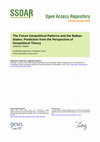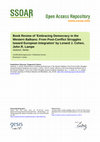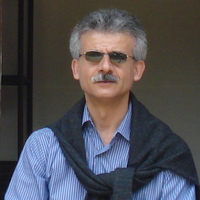Papers by Stefan Janković

Filozofija i društvo, 2024
By examining debates on the Anthropocene era ignited by new materialist and posthumanist scholars... more By examining debates on the Anthropocene era ignited by new materialist and posthumanist scholarship, this paper aims to discern how these perspectives can reframe the human-nature nexus. It also considers how various "developmentalist" approaches might assume the role traditionally held by the concept of human nature. The first section highlights concerns raised by posthumanist and neomaterialist scholars about the marginalized status of "nature", life, and biology within dominant constructivist viewpoints. A central argument posits that notions like "denaturalization" and biopolitics amplify societal dominance over nature, pushing social theory towards an anthropocentric and potentially biologically indeterminate stance. Contrasting this, the second section delves into modern interpretations of the planet in social theory, inspired by the emergence of the Anthropocene. This lens reveals a dynamic, co-constitutive relationship, tilting less towards the unilateral commands of "nature" and more towards understanding the evolution of human life and societal structures within Earth's expansive temporal and spatial realms. The third section further unpacks these developmental ideas by juxtaposing the theories of Bruno Latour and Tim Ingold. The paper contends that both approaches endeavor to illuminate the complex processes underpinning the evolution of life forms, underscoring the significance of culture. In conclusion, the intricate postnatural landscape of the Anthropocene necessitates a more integrated human-nature relationship. This calls for not only discarding dehumanizing facets of human nature, but also fostering a renewed sensibility-a deeper form of humanizing that acknowledges and celebrates our shared existence with other species and entities.

European Quarterly of Political Attitudes and Mentalities, Apr 1, 2013
This paper provides a prediction of future geopolitical patterns related to the Balkan states, on... more This paper provides a prediction of future geopolitical patterns related to the Balkan states, on the basis of assumptions offered by the Geopolitical Theory. In general, on the long-term, it is shown that the Balkan states are excluded from the possibility of acquiring cumulative advantages as preconditions for further expansion. As a result, their position in the structure of geopolitical relations gives them the character of internal states, which, if not subordinated to the expansive power, are driven by empirically confirmed patterns of confrontation and fragmentation into smaller units. However, the analysis showed that the EU can be provisionally defined as the expansive force in a given geopolitical context. Therefore, the ratio of the Balkans and the European Union demonstrates the ongoing process of expansion, so in the medium term the decrease or freeze of antagonisms, and fragmentation into smaller units that are characterized by internal states can be expected. Certainly, this trend is conditioned by the assumption that the EU has a relatively coherent geopolitical interests.

Sociologija, 2016
Paper illuminates ethno-national identifications of Serbia's bureaucratic-political elite, assumi... more Paper illuminates ethno-national identifications of Serbia's bureaucratic-political elite, assuming its (con)figurative principles and diverging forms oscillate between capacities for political mobilization while simultaneously reflecting latency of social order(s). The analysis rests on the data obtained in survey of Serbia's political elite conducted in 2015, by using Bourdieu's concept of (political) field and locating these (con)figurations of ethno-national identification as expression of particular (dis)positions and social relations. Prior to the analysis, insufficiencies contained in dominant conceptualizations of identity are exposed, followed by reassessment of theories of nation and ethnicity by highlighting blurred line discontinuity between ethnos/nation has, due to processes of historical (de) politicization. The analysis first detects objective structure of Serbia's bureaucraticpolitical field. Through construction of scale of ethno-national valence it is shown that detected divergent degrees of ethno-national attachment correspond to structure of bureaucratic-political field, conforming the particular positions of political groups. Divergent contents of ethno-national identification among political groups are extensively analyzed and interpreted as a reflection of fieldstructure and capacity for political mobilization. In conclusion, it is noted that (con)figurations of ethno-national identity among Serbian bureaucratic-political elite differentiate around ethnic, but converge around etatist dimensions, reflecting the opposing conceptions of "valid" political community.

Sociologija, 2016
Paper illuminates ethno-national identifications of Serbia?s bureaucratic-political elite, assumi... more Paper illuminates ethno-national identifications of Serbia?s bureaucratic-political elite, assuming its (con)figurative principles and diverging forms oscillate between capacities for political mobilization while simultaneously reflecting latency of social order(s). The analysis rests on the data obtained in survey of Serbia?s political elite conducted in 2015, by using Bourdieu?s concept of (political) field and locating these (con)figurations of ethno-national identification as expression of particular (dis)positions and social relations. Prior to the analysis, insufficiencies contained in dominant conceptualizations of identity are exposed, followed by reassessment of theories of nation and ethnicity by highlighting blurred line discontinuity between ethnos/nation has, due to processes of historical (de) politicization. The analysis first detects objective structure of Serbia?s bureaucraticpolitical field. Through construction of scale of ethno-national valence it is shown that d...

Sociologija, 2013
The paper gives a historical account of the genesis of marginal social position explanations in t... more The paper gives a historical account of the genesis of marginal social position explanations in the USA, with special emphasis on the characteristics, related to the generating of cultural factors in explanation. In this light, the two fundamental and interrelated concepts are being indentified - the culture of poverty and the underclass, whose conceptual genesis, in a causal manner, varies between structural and cultural grounding. Due the translation of perceived minority behavioural patterns into the dimensions used for defining the marginal social position, conceptual validity of the underclass has been heavily disputed. At the same time, dilemmas created by the implementation of cultural factors constructed in that way open up broader issues of the relationship between culture and structure, lines of determination and the possibility of a consistent explanation of marginal social position.

Sociologija, 2019
In the past quarter of century, sociology encountered several distinct attempts that assign thems... more In the past quarter of century, sociology encountered several distinct attempts that assign themselves a task of ample reconstruction of disciplinary grounds. Analytical sociology grows among these, as a peculiar tangle of solutions filled with causalist language common to epistemology which preceded the relativist blow in the 1960s, focused on explaining the individual actions as ?original? sense of sociologist?s job and restoration of Merton?s mid-range theory. By following Pierre Bourdieu?s theory of scientific field and the Andrew Abbott?s model of fractal distinctions, this paper seeks to discern the emergence of analytical sociology. Unlike the two ?common? alternatives in science studies - constructivism and realism, these approaches offer richer ground for tracing of scientific flows, by focusing on amalgamations that form scientists? practices through divisions, conventions, acclamations and mutual evaluations. Their particular advantage also is in treatment of moral dimens...

Etnoantropološki problemi / Issues in Ethnology and Anthropology
The paper comparatively explores the projects of Gaia and the planet as the new images of the Ear... more The paper comparatively explores the projects of Gaia and the planet as the new images of the Earth, proposed by Bruno Latour and Dipesh Chakrabarty respectively. With critical emphasis placed on the political theology of the apocalypse present in both projects, the paper draws broader implications of such a geospiritual turn in the Anthropocene debates. Whereas the introduction gives a glimpse into the problem of the Anthropocene, the second section explores Latour's reinterpretation of the “Gaia Hypothesis” in the anti-holistic key through the critique of modernity, theory of agency and novel methodology of geotracing, designed to unravel the organic transactions and links of the so-called critical zone. The third section discusses Latour's geophilosophical experiment of building the mythical prototype of the Earthlings, as a special kind of ecological sensitivity, and points out the problem of setting up science as a new earthly religion. Section four focuses on Chakrabar...

Etnoantropološki problemi, 2022
Rad uporedno ispituje projekte Gaje i planete kao nove prikaze Zemlje, koje je predložio Bruno La... more Rad uporedno ispituje projekte Gaje i planete kao nove prikaze Zemlje, koje je predložio Bruno Latur, odnosno Dipeš Čakrabarti. Sa kritičkim naglaskom stavljenim na političku teologiju apokalipse, prisutnoj u oba projekta, ocrtavaju se šire implikacije ovakvog geospiritualnog zaokreta u debatama o antropocenu. Dok uvod pruža kratak uvid u problematiku antropocena, u drugom delu se ispituje Laturova reinterpretacija "Gaja-hipoteze" u antiholističkom ključu kroz kritiku modernosti, teoriju dejstvenosti, ali i novu metodologiju geotrasiranja, osmišljenoj za otkrivanje organskih transakcija i spona u tzv. kritičnoj zoni. U trećoj sekciji se diskutuje o Laturovom geofilozofskom eksperimentu izgradnje mitskog prototipa Zemljana, kao posebnog vida ekološke senzitivnosti, i ukazuje na problem postavljanja nauke kao nove zemaljske religije. Četvrta sekcija je posvećena Čakrabartijevom konceptu planete koji je upućen na "otkrivanje" duboke istorije planete, obračun s antropocentrizmom i "plitkom" istorijom humanih formacija, ali i umetanje radikalne klimatske neizvesnosti u svakodnevicu i uspostavljanje nastanjivosti planete. U petoj sekciji, međutim, bliže pojašnjavamo problem obima koji se javlja u Čakrabartijevom radu, odnosno, pitanja kako otvoriti senzibilnost za tako glomazan skup entiteta kao što je planeta. Iskazujući relativno nepoverenje prema nauci, Čakrabarti se radije opredeljuje za teološko strahopoštovanje što, tvrdimo, biva teško ostvarivo upravo u planetarnim okvirima. U zaključku, osvrnućemo se ukratko na koncept rezilijentnosti kao potencijalnu dopunu ovih gledišta.

Predmet ove disertacije čini razmatranje svakodnevnih praksi kroz prostore stanovanja u Zemunu. N... more Predmet ove disertacije čini razmatranje svakodnevnih praksi kroz prostore stanovanja u Zemunu. Namesto prihvatanja holističkih okvira, samo istraživanje je izgrađeno na temeljima osobene ontološke matrice koja akcentuje lokalne kontingencije gde se praktični život odvija relaciono i procesualno, prvenstveno kroz formiranje ključnih odlika društvenog života kroz prostore stanovanja i njegovo odigravanje koje se zbiva kroz svakodnevne prakse. Počev od pretpostavke da se formiranjem prostora stanovanja u konkretnom slučaju Zemuna suštinski formiraju i zasebne stvarnosti i progresivno odvajaju kolektivi kroz rezidencijalne zone, ovo istraživanje stremi ka tome da rašlani vezu između društvenog života i prostora. Stanovanje je stoga preuzeto kao alternativni pristup urbanim prostorima. Promišljajući ih kao komplikovane i heterogene konfiguracije ono podvlači kako su kolektivi upućeni na različite stvarnosti i forme života, posebno kroz bitno drugačije oblike oblike prostornosti i prakse...

Sociološki Pregled, Oct 19, 2020
Along with climate change, the COVID-19 pandemic represents a specific planetary event, with surp... more Along with climate change, the COVID-19 pandemic represents a specific planetary event, with surprising effects that require a rethinking of the social. The paper starts from the thesis that the pandemic essentially undermines modernity and the institutions of sovereignty, geopolitics and political economy due to their essential separation from non-human things. In the second part of the paper four propositions for a better understanding of planetary events are offered, including removing the difference of parts/wholes, non-relational thinking, rejecting the difference between global and local, and understanding collectives as constantly made in a continuum of humans and non-humas. Finally, the importance of speculation as the basis of planetary thinking is considered. There is a need to revise scientific practice and enhance its sensitivity to recognizing heterogeneous attachments of humans and non-humans in planetary settings.

Along with climate change, the COVID-19 pandemic represents a specific planetary event, with surp... more Along with climate change, the COVID-19 pandemic represents a specific planetary event, with surprising effects that require a rethinking of the social. The paper starts from the thesis that the pandemic essentially undermines modernity and the institutions of sovereignty, geopolitics and political economy due to their essential separation from non-human things. In the second part of the paper four propositions for a better understanding of planetary events are offered, including removing the difference of parts/wholes, non-relational thinking, rejecting the difference between global and local, and understanding collectives as constantly made in a continuum of humans and non-humans. Finally, the importance of speculation as the basis of planetary thinking is considered. There is a need to revise scientific practice and enhance its sensitivity to recognizing heterogeneous attachments of humans and non-humans in planetary settings.

Sociologija, 2021
Recent results from Round 9 of the European Social Survey (ESS) indicate that Serbia differs from... more Recent results from Round 9 of the European Social Survey (ESS) indicate that Serbia differs from other European countries in terms of justice and fairness. Whereas the Serbian people?s dissatisfaction relating to unjust income distribution, unfair employment chances and political institutions may not be surprising, these findings still raise a dozen questions. Situated within contemporary discussions on normativity in sociology and survey methodology, this paper aims to reassess the moral grammar of these judgments. By endorsing tenets of pragmatic sociology and its principal aim to recognize the plural modes of valuation and criticism and reflective capacities of social actors to judge and evaluate, this paper develops around few major points. First, we underline how most major approaches to axiology remain stuck in a co-determinist framework, thereby renewing a number of dualisms. Instead, we opt for a relational approach and further present how the theoretical model of Boltanski...

European Quarterly of Political Attitudes and Mentalities, 2013
Insights Into the Political Conditions in the Western BalkansUnderstanding of complex social proc... more Insights Into the Political Conditions in the Western BalkansUnderstanding of complex social processes that took place in the Balkans in the past two decades is inseparable both from the specificities of the conflict in former Yugoslavia and the collapse of socialism in Eastern Europe. One such attempt, especially aimed at the prospects of building democracy in the light of these processes is the study "Embracing Democracy in the Western Balkans", written by Lenard Cohen and John Lampe.The aim of this study is a comparative evaluation of democratic consolidation in the states created by dissolution of Yugoslavia and Albania, respectively, consideration of these countries potentials and the Western Balkans as a whole, to establish democratic orders after the (armed) conflict. Authors percieve democratic consolidation as a possible counterweight to the authoritarian regression, teleologicaly binding the process of consolidation with that of generating stability, certainty an...

Corvinus Journal of Sociology and Social Policy, 2020
Our research principally engages with the issue of encounters with COVID-19 within an everyday fr... more Our research principally engages with the issue of encounters with COVID-19 within an everyday frame, underlining how the restoration of a “distorted” familiar environment occurs through gradual coping with such a mysterious non-human entity. The specific objective of our project was to discern how 20 young professionals from Belgrade (Serbia), whom we interviewed during the curfew, encountered, re-organized, and eventually re-settled into their common, everyday spaces and routines, while the virus was spreading in the background. Our examination first seeks to register how the distorted relationality of humans with a non-human entity – which the virus is – became distilled into everyday objectivity. More profoundly, we intended to seek understanding of what alternations the possibility of getting infected were associated with common, everyday arrangements, and how the actors pursued hygienic “purification” as a principal task. In this sense, we managed to unveil that – albeit this ...

In 2012, plans were announced to develop a large-scale mixed-use waterfront project along the Sav... more In 2012, plans were announced to develop a large-scale mixed-use waterfront project along the Sava River in central Belgrade. Within 30 years, the 80-hectare site is projected to contain the region's largest shopping mall, alongside thousands of square metres of luxury apartments and high-end offices. Promises of a 3.5 billion euro investment from the United Arab Emirates associated with this real estate development project quickly led to polemical interactions and tensions between the plan's supporters and critics. Based on a variety of qualitative methods, including in-depth interviews conducted in Belgrade, Dubai and Abu Dhabi, we will outline the strategies and actions that key actors and stakeholders undertook, particularly during the project's early implementation phase in 2015 and 2016. We will illustrate how these interactions and tensions between and among the actors took place on and across different scales. Prior to empirical investigation of confrontational actor-relations, the paper will concisely discuss how Belgrade Waterfront fits into a wider global trend of "world city entrepreneurialism" and associated state rescaling processes. On that basis, the paper will then focus on how this transnational real estate development project, despite claims that it will increase competitiveness and employment, came to be perceived as a potential threat by its opponents (who assume that it will trigger uneven development and functions as a catalyst for authoritarianism). This brings us to the focal point of the contesting voices and actions arrayed against this project, which revolves primarily around claims that the "public" are being excluded during its implementation.
Books by Stefan Janković
Rizici i šanse savremenih migracija
У овој монографији три аутора са Одељења за социологију
Филозофског факултета и чланови Института... more У овој монографији три аутора са Одељења за социологију
Филозофског факултета и чланови Института за социолошка
истраживања, писала су на тему савремених миграција, пола-
зећи од наведеног ширег контекста природног и друштвеног
окружења и њихових промена, који обликују савремене миг-
рационе процесе, утичући на њихове узроке, последице, то-
кове и трансформације, као и рефлексије у науци, медијима,
политици и свакодневном животу. Прва два поглавља су ем-
пиријски заснована на подацима сопственог теренског истра-
живања, док је треће оријентисано на теоријску расправу која
се ослања и на секундарну анализу релевантних емпиријских
студија и анализа.











Uploads
Papers by Stefan Janković
Books by Stefan Janković
Филозофског факултета и чланови Института за социолошка
истраживања, писала су на тему савремених миграција, пола-
зећи од наведеног ширег контекста природног и друштвеног
окружења и њихових промена, који обликују савремене миг-
рационе процесе, утичући на њихове узроке, последице, то-
кове и трансформације, као и рефлексије у науци, медијима,
политици и свакодневном животу. Прва два поглавља су ем-
пиријски заснована на подацима сопственог теренског истра-
живања, док је треће оријентисано на теоријску расправу која
се ослања и на секундарну анализу релевантних емпиријских
студија и анализа.
Филозофског факултета и чланови Института за социолошка
истраживања, писала су на тему савремених миграција, пола-
зећи од наведеног ширег контекста природног и друштвеног
окружења и њихових промена, који обликују савремене миг-
рационе процесе, утичући на њихове узроке, последице, то-
кове и трансформације, као и рефлексије у науци, медијима,
политици и свакодневном животу. Прва два поглавља су ем-
пиријски заснована на подацима сопственог теренског истра-
живања, док је треће оријентисано на теоријску расправу која
се ослања и на секундарну анализу релевантних емпиријских
студија и анализа.